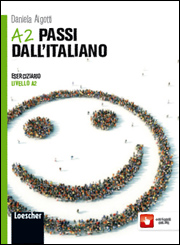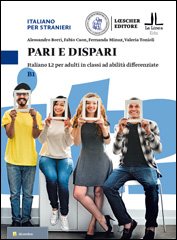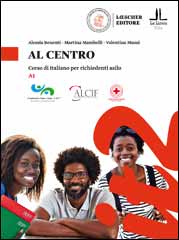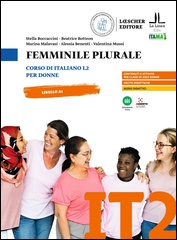Eserciziario di italiano per stranieri
di Daniela Aigotti
Loescher Editore
Destinatari: Adulti, Studenti e studentesse di italiano come lingua straniera e seconda
Livello: A2
Anno di pubblicazione: 2012
Elementi caratterizzanti
• Lessico - Circa 1000 parole del lessico di base, più una cinquantina di parole che possono ricorrere nella vita quotidiana degli stranieri adulti.
• Morfosintassi e azioni sociocomunicative - Forme e usi della grammatica di base previsti per il livello A2.
• Abilità:
- Gli esercizi si fondano sull’abilità di comprensione della lettura e di produzione (guidata e libera, scritta e orale).
- Tutti gli esercizi sono pensati per un utilizzo sia scritto – in classe o in autonomia – sia orale, con la possibilità di sviluppare dialoghi e conversazioni nel gruppo.
- Tutte le frasi di esercizi apparentemente solo grammaticali si prestano anche alla conversazione in classe.
- Gli esempi forniti sono uno spunto per l’insegnante di come lavorare sul testo, ampliando ogni frase “grammaticale” con la conversazione che ne può derivare: «Davvero? È così? E tu che cosa ne pensi? Perché è successo questo? Quando? Chi l’ha detto? E tu? E lui invece?».
• Le cinque W - Si è dato largo spazio in ogni unità a domande (chi?, che cosa? quando?...) che possono ricorrere ogni giorno parlando degli argomenti quotidiani.
• Appendice:
- il glossario delle 1000 parole;
- i 100 verbi più usati dell’italiano;
- le funzioni linguistiche presentate.
-
English decription
This book deals with the main aspects of everyday life and develops basic vocabulary, grammar and speaking language skills to reach level A2 language competence.
VOCABULARY
About 1000 basic vocabulary items, and over fifty words which are likely to occur in adult foreign speakers’ everyday life.
MORPHOSYNTAX AND SOCIO-COMMUNICATIVE ACTIONS
Basic Grammar forms and uses for A2 level.
SKILLS
• The exercises are based on reading comprehension skills and language production skills (guided and free, written and oral).
• All of the exercises have been designed for developing both writing and speaking skills – for class use or self-study – and offer the possibility of developing group dialogue and conversations.
• Examples are provided so as to give teachers some hints on how to exploit the text , by extending every “grammar sentence” with the conversation which can be generated from it: «Really? Is that really so? And what do you think? Why did this happen? When? Who said that? And what about you? And what about him instead?».
The 5 W
In every unit the emphasis is placed on the questions (such as Who? What? When?) which are likely to be used in daily speech when speaking about everyday topics.
APPENDIX
• A 1000 word glossary;
• The 100 verbs that are most frequently used in Italian;
• the presented language functions.








